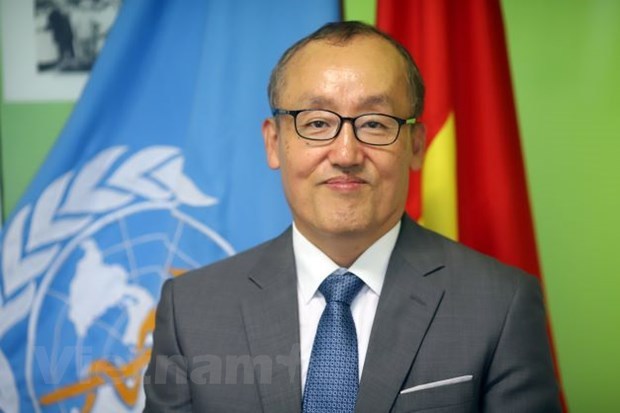 WHO Representative in Vietnam Dr Kidong Park. (Photo courtesy of WHO)
WHO Representative in Vietnam Dr Kidong Park. (Photo courtesy of WHO)Hanoi (VNA) – As the
COVID-19 pandemic has still been developing complicatedly in the world, the
(VNA)’s reporter had an interview with WHO Representative in Vietnam Dr Kidong Park about the
and pharmaceutical firms’ announcements that their COVID-19 vaccines are efficient and safe for kids.
The following is the full text of the
interview.
Reporter: What is the World Health Organization
(WHO)’s opinion about the necessity
to get a COVID-19 vaccine booster shot?
Dr Kidong Park: There are two key considerations
guiding WHO’s position on booster doses. First
is the scientific evidence. WHO is carefully monitoring the rapidly evolving
body of evidence regarding the need for booster doses. There is currently no conclusive
evidence stating that COVID-19 vaccine efficacy against severe disease and
death wanes significantly over time.
There are several studies that indicate
a decline in effectiveness against mild and moderate infection, however,
prevention of severe disease and death is the most relevant outcome that the
vaccines are intended to impact. There
is emerging evidence that the vaccines have remained effective at preventing
severe disease and death.
WHO has not ruled out that boosters for
some populations groups may be warranted in the future. WHO will continue to
monitor any new evidence and will review its position as the data evolve.
The second is the moral and ethical
implications. Whilst
huge inequities in vaccine rollout continue across the world, the priority
should be on ensuring that all countries use limited vaccine supplies to
provide high coverage of first and second doses, to priority populations such
as the health workers and frontline responders, elderly and those with
underlying medical conditions.
On August 4, 2021, WHO called for a time-limited moratorium on COVID-19 booster doses until
the end of September with the intent to allow for at least 10 percent of every population of each
country to be vaccinated.
WHO urges all countries to ensure that
all vulnerable populations such as health workers and frontline responders, the
elderly and those with underlying medical conditions receive the primary course
of vaccination, prior to providing boosters.
Reporter: Many pharmaceutical brands have
recently announced that their COVID-19 vaccines are efficient and safe for kids
aged 3 years old above. What is WHO’s comment?
Dr Kidong Park: Efficacy and safety profiles of a
vaccine in children might be different from those of adult. Injection volume
for children might be different from those of adult.
Current evidence suggests that children
in general are less likely to suffer from severe disease and death following
COVID-19 infection or disease though children with underlying conditions are at
increased risk of severe illness.
Because of this, vaccines are
first developed for adult and priorities for vaccination are given to health
care workers, frontline workers and high risk population such as elderly and
persons with co-morbidities.
After launching the vaccines for
adults, the vaccine manufactures have continued its research for vaccines for
children. To date, there is only one COVID-19 vaccine recommended for children
from 12 – 18 years old by WHO Strategic Advisory Group of Experts on
Immunization (SAGE) and approved by the WHO Emergency Use Listing which is the
Pfizer/BioNTech vaccine.
We are aware that other vaccine
manufacturers are also conducting researches for COVID-19 vaccine for children.
Once data is available, the national regulatory authorities will evaluate and
consider for emergency use authorization. WHO will also do so an update its recommendation and Emergency Use
Listing./.
Source: VietnamPlus
